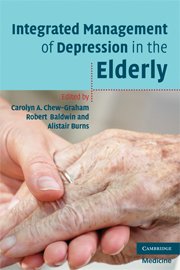Book contents
- Frontmatter
- Contents
- Contributors
- Foreword
- Preface
- Acknowledgements
- 1 Late-life depression: an introduction
- 2 Management of late-life depression
- 3 Management of late-life depression in primary care: case studies UK
- 4 Management of more complicated depression in primary care: case studies UK
- 5 Management of late-life depression across primary and secondary care: case studies UK
- 6 Management of late-life depression around the world: summary of international commentaries
- 7 Resources
- Appendix: International commentaries
- Index
- References
Appendix: International commentaries
Published online by Cambridge University Press: 18 December 2009
- Frontmatter
- Contents
- Contributors
- Foreword
- Preface
- Acknowledgements
- 1 Late-life depression: an introduction
- 2 Management of late-life depression
- 3 Management of late-life depression in primary care: case studies UK
- 4 Management of more complicated depression in primary care: case studies UK
- 5 Management of late-life depression across primary and secondary care: case studies UK
- 6 Management of late-life depression around the world: summary of international commentaries
- 7 Resources
- Appendix: International commentaries
- Index
- References
Summary
The editors summarized the contributions written by colleagues in different parts of the world (Chapter 6) to illustrate the similarities, and occasional differences, in the management of depression in older people described in all the contributions. This appendix allows the reader to read the individual contributions.
Australia
Assessment
This 82-year-old woman is chronically disabled by pain and breathlessness and appears to have become socially disengaged. She has several symptoms of depression, including persistent low mood, loss of energy (which sounds to be out of proportion to her medical state), early morning waking, loss of interest in previously enjoyed activities, and persistent feelings that life is not worth living. The vignette does not provide information about her appetite and weight, concentration, any psychomotor changes, guilt feelings or confidence levels, but even so it is clear that, provided the symptoms have been present for two weeks (and this seems highly likely), she meets both DSM-IV diagnostic criteria for a major depressive episode and ICD-10 criteria for a depressive episode.
Australian health-care system
Within the Australian health-care system, in which specialists are accessible only after referral from a general practitioner (GP), this woman would normally be managed by her GP who in all likelihood will already be engaged in the management of her troublesome osteoarthritis and chronic obstructive pulmonary disease (COPD). She might well attend a respiratory outpatient clinic or rheumatology clinic in a public hospital, or (less likely as fewer than one-third of the elderly have private health insurance) be seeing a private medical specialist with expertise in one or both of these two areas.
- Type
- Chapter
- Information
- Integrated Management of Depression in the Elderly , pp. 140 - 177Publisher: Cambridge University PressPrint publication year: 2008



